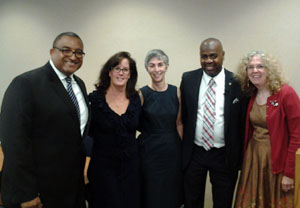Site Search
- resource provided by the Forum Network Knowledgebase.
Search Tip: Search with " " to find exact matches.

... to the company’s conference center. Mayor Baraka talked about new interventions for youth at risk and targeting crime ...
News Type: Newark Liaison
Audience: All Funders
Funding Area: Newark Funders
... these COVID-19 funds and assistance programs. We’ll hear about the ALICE Recovery Fund from CEO Kiran Gaudioso and ...
Event Type: Funder Briefing
Audience: All Funders
Topic: COVID-19
Join us for an informative session with Justin Scheid, New Jersey Field Office Director at the US Department of Housing and Urban Development. The Field Office manages a range of important programs...
Event Type: Funder Briefing
Audience: All Funders
Topic: COVID-19
At a time when nonprofits and philanthropy were needed the most, the pandemic forced most social sector organizations to go fully or partially remote. As we enter 2021, it seems that many organizations will continue to operate virtually for some time...
Event Type: Funder Briefing
Audience: All Funders
Topic: COVID-19
... reached out to nonprofits and other stakeholders to learn about needs throughout the region. Learning loss due to the ...
News Type: News
Topic: COVID-19Grantmaking
... navigating the unprecedented financial challenges brought about by the pandemic,” noted Secretary of State Tahesha ...
News Type: News
Topic: Grantmaking
... a stronger, more resilient state. Register now to hear about how the New Jersey Pandemic Relief Fund is providing ...
Event Type: Funder Briefing
Audience: All Funders
Topic: COVID-19
... (HR) professionals, people managers, and business leaders about the benefits of providing a more equitable, diverse ...
News Type: News
Topic: Grantmaking
Funding Area: Employment/JobsRacial Equity
... high-quality, and accessible local news to stay informed about policy changes and other community responses, how to ...
Event Type: Funder Briefing
Topic: COVID-19
... connect outside volunteers and supporters, educating them about the city and building stronger connections with the ...
News Type: News
Audience: All Funders
Topic: Grantmaking
... nonprofit leaders, and key stakeholders and learned about the urgent need to create more workforce development ...
News Type: News
... of the Schumann Fund for New Jersey in conversation about the nuances and benefits of collaboration. At the ...
Event Type: Signature Events
... casual conversation to connect with colleagues, learn more about what’s happening across New Jersey philanthropy, and ...
Event Type: Affinity Group Meeting
Audience: Emerging Practitioners
... for action and partnership, from spreading awareness about the importance of 2020 Census in your communities and ... raised and answered the most important questions about the Census and what needs to be done for a...
Event Type: Signature Events
Audience: All FundersNon Profit Staff
... Independent Sector: Policy and Advocacy To learn more about what CNJG is doing to foster deeper relationships ...
... Funders Affinity Group for breakfast and a discussion about one of the most critical funding needs of our time: the ...
Event Type: Meeting
Audience: All Funders
Funding Area: Environment
... and funders for a post-election debrief and discussion about these new realities, what strategies are already being ...
Event Type: Partner
Audience: All Funders
... from the program attended the event, sharing testimonials about its impact on their communities. The NPP provides grant ...
News Type: News
Topic: Grantmaking
... interest in continuing the dialogue, sharing information about the philanthropic activity in the city and exploring ...
... resources , and forge sustainable solutions to bring about long-term change. This is essential when faced with ...
